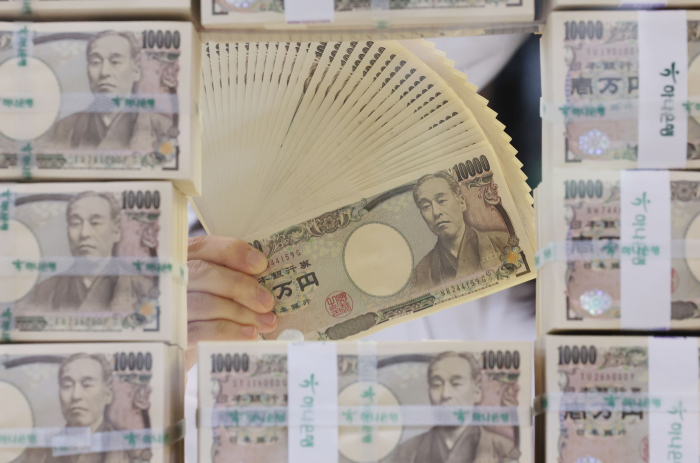S.Koreans boost Japanese yen savings to record high
The weakening yen spurs bargain-hunting from Korean importers and households, rather than investors
By Mar 29, 2022 (Gmt+09:00)
LG Chem to sell water filter business to Glenwood PE for $692 million


Kyobo Life poised to buy Japan’s SBI Group-owned savings bank


KT&G eyes overseas M&A after rejecting activist fund's offer


StockX in merger talks with Naver’s online reseller Kream


Mirae Asset to be named Korea Post’s core real estate fund operator



The sliding yen has prompted South Korean importers and households to go bargain-hunting for the Japanese currency, which they believe is near its trough.
As of March 25, the balance of yen-denominated deposits at the country's top five retail banks reached its highest level ever of 596.3 billion yen ($4.8 billion) in aggregate, according to banking industry sources on Tuesday.
The combined yen-currency deposits at Kookmin, Shinhan, KEB Hana, Woori and NongHyup were up 25% from a year earlier and 6% more than the previous record of 563.3 billion yen hit in May 2021.
Since the start of this month, Korean companies and individuals have stepped up their buying spree of the yen, which accelerated its downward run to scrape the lowest level in six and a half years against the dollar and a three-year trough to the Korean won this week.
Their increased appetite for the yen seems to contrast with that of global investors, who have been fleeing the yen into high-yielding currencies.
However, banking officials said that the growing demand for the Japanese currency was not being driven by investors, but in large part by Korean importers and travelers.
"Some companies, which import heavily from Japan, are making big purchases of the yen in the spot market and deposit them at banks," said a domestic banking official.
"Also, a growing number of students studying in Japan and individuals preparing for a trip to Japan want to exchange their money into yen in advance."

Foreign-currency savings accounts hardly offer deposit rates but charge low exchange fees, allowing their savers to freely withdraw money in the designated currency.
This month alone, one of the country's top five lenders with heavy exposure to retail banking saw a 38% on-year surge of money inflows to its yen-denominated savings accounts, swelling its balance by 74 billion won ($61 million) this month.
"In the past, the yen was chased as a safe-haven asset by portfolio investors, but now such demand is waning," said another local bank official.
The yen declined by 0.43 won to the Korean currency this month to close the local trade at 9.89 against the won on Tuesday, its lowest level since Dec. 5, 2018.
Against the dollar, it staged a slight rebound to 123 on Tuesday, a day after plunging to 125, its weakest level since August 2015.
Earlier this month, the Bank of Japan left its policy rate steady at negative 0.1%. Bucking the global trend of monetary tightening to curb inflation, the Japanese central bank on Monday reaffirmed its commitment to stimulus measures to keep its bond yields low.
Japan is the world’s second-largest nation in terms of foreign exchange reserves after China. But traders forecast further drops in the yen due to its loose monetary policy and accumulated current account deficits.
Meanwhile, South Korean travelers are looking again to Japan as Asiana Airlines Inc., one of the country's two flagship carriers, is scheduled to resume flights to Nagoya, Japan next month, after one-year hiatus.
Write to Nan-Sae Bin at binthere@hankyung.com
Yeonhee Kim edited this article.
-
 MarketsKorea won at three-year high vs yen on rate differentials
MarketsKorea won at three-year high vs yen on rate differentialsMar 28, 2022 (Gmt+09:00)
2 Min read -
 AirlinesGlobal airlines raise flights to pre-COVID levels on border reopening
AirlinesGlobal airlines raise flights to pre-COVID levels on border reopeningMar 14, 2022 (Gmt+09:00)
4 Min read -
 War in UkraineKorean won extends losses as oil hits 14-year high
War in UkraineKorean won extends losses as oil hits 14-year highMar 07, 2022 (Gmt+09:00)
2 Min read


